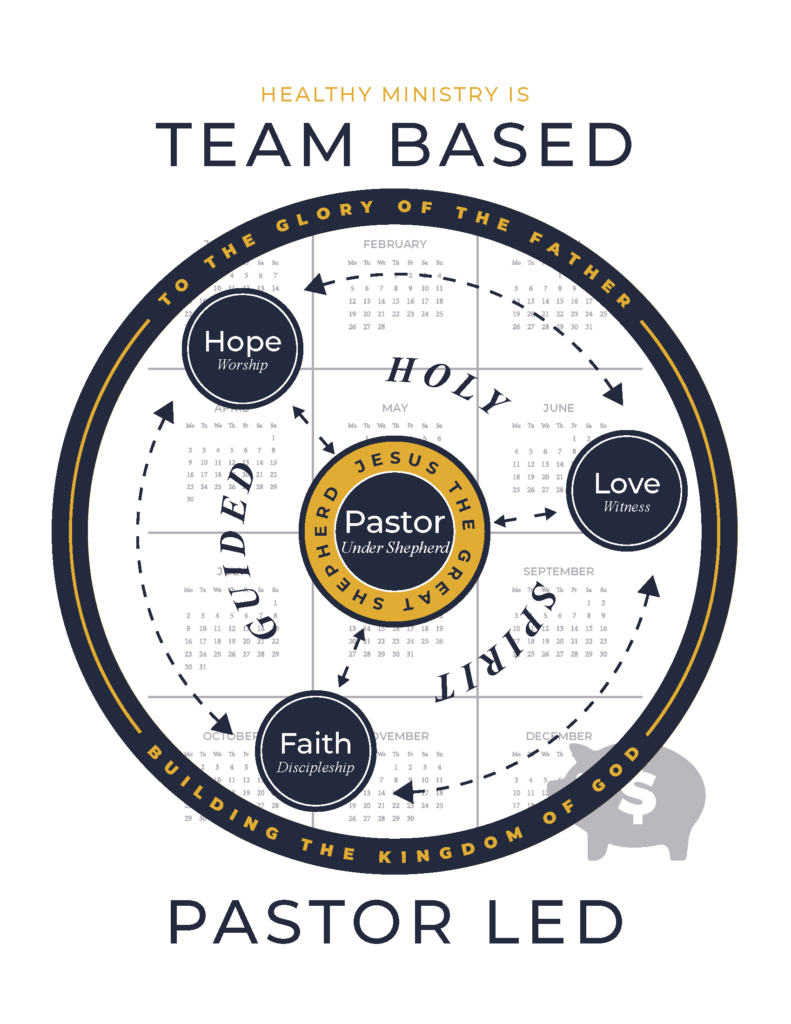Love, hope, and faith are more than just biblical words describing a church—they continually remind us why we pursue healthy church.

By Jeff Broadnax, Regional Director, US East
In a 2018 Speaking of Life video titled “Where there is no vision,” President Greg Williams declared, “The movement toward a shared vision galvanizes people; it gives them purpose. A clear vision provides focus. Vision unites and inspires.” Soon after that, he introduced a fresh vision for GCI known as “Healthy Church.”
Around that same time, we offered our first “church hack” on the Faith, Hope and Love Avenues in GCI Equipper. We initially used the word “venues,” but found it too complicated to translate internationally. In addition, the term venue didn’t quite convey the picture of being on the road to becoming a healthy church; the term avenue seemed a better descriptor.
Some have asked, “Why can’t we just use the terms the rest of the Christian world uses? You know, terms like discipleship, worship, witness.” Others asked, “wouldn’t it be easier to use terms like upward, inward and outward to describe the markers of a healthy church rather than the generic faith, hope and love?”
These are good questions. I asked some of those questions myself and still use the terms to help translate when people struggle in understanding the hope, faith and love avenues. I also noticed a significant difference in the terms that helped me embrace the avenue vocabulary at a deeper level.
The last several years has brought skepticism and almost distrust to traditional, plain Christian vocabulary. Just say the word evangelical or evangelism to many, and their antenna of cynicism start going off. Even the term witness doesn’t enjoy the power and relevance it had in earlier decades. Rather, it often creates defensiveness.
The most significant difference I have come to see is that descriptors like upward, inward, outward, or worship, witness and discipleship describe more what and how we share the gospel of Jesus as believers. When I took a fresh look at the hope, faith and love avenue terminology, I began to see that those descriptors express our why for witnessing, worshipping or discipling.
Consider this. In a healthy church, leaders and members have courageously stepped out of the walls of the church and into the neighborhood surrounding the church (the one square mile) to share the tangible and transforming love of Christ we have freely received. Joining Jesus “as we go” about our daily lives, his love compels us to look for ways to share his love and life with those we come in contact with. This leads to visitors and family members joining us in worship on a given Sunday.
Continuing: In a healthy church with healthy leaders, our weekly worship time should put people on the road to regularly experience and embrace the hope we have in Jesus. From the time a visitor (or family member) gets out of a car in our parking lot to the time they pull into their driveway at home, they should find members facilitating their Spirit-led journey of worship, fellowship, inspiration, welcome and blessing.
To follow up: Once these visitors have engaged with healthy leaders and congregations, the intentional pathway of life-on-life (or connect group) discipleship should lead them to an ever-deepening faith-walk with Jesus and other believers. The process makes sense and, as Paul pointed out, starts with “the greatest of these”—love.
These biblical terms take a deeper meaning when we are ready to give an answer as to why we evangelize, worship and disciple — we are following the lead of Jesus, the apostle Paul and the other New Testament writers and believers.
The terminology of hope, faith and love avenues still may feel a little clunky coming off the tongue, but I hope this reframe has helped.
Being on the avenue or road that facilitates Christ-centered, Spirit-led growth in hope, faith and love is the why of the disciple-maker. It is our prayer, as Greg stated, to have living and sharing the gospel of Jesus spring out of healthy leaders who equip others to be “the best expression of the church of Jesus Christ they can be!”
Instead of experiencing the avenues as just new terminology, let’s try to see them as words that reflect the journey on the road to our deeper “why” – the hope, faith and love we have in Jesus.




This adds a lot to the clarity of using Hope, Faith and Love Answering the WHY. Thanks for this explanation. We will add this to our continuing support of our emphasis on being healthy churches and working with our avenue champions.
Good points, showing how the use of these 3 terms is not really unusual. The NT puts them all together at least three times, in 1 Cor. 13:13; 1 Thes. 1:3; 1 Thes. 5:8,
Remembering without ceasing your work of faith, and labor of love, and patience of hope in our Lord Jesus Christ, in the sight of God and our Father; (1 Thes. 1:3)
But let us, who are of the day, be sober, putting on the breastplate of faith and love; and for an helmet, the hope of salvation. (1 Thes. 5:8)
Now these three remain: faith, hope, and love.
But the greatest of these is love. (1 Cor. 13:13)
Very helpful – thanks, Jeff!